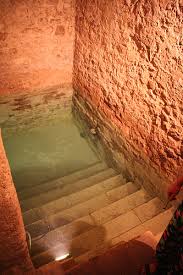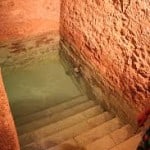“If any of these dead [animals] falls on a vessel, it will become unclean…. That article must be immersed in a mikveh …” (Lev. 11:32)
The topic of ritual impurity is a difficult one. This impurity is not a tangible quality that may be seen or felt. It is a spiritual contamination, the result of association with death. To purify ourselves from this contamination, we must immerse ourselves in a natural spring or a ritual bath (mikveh) filled with rainwater.
Why Immersion in Water?
The story is told of a wealthy American Jew who decided to visit one of the leading Torah scholars of his generation. Upon arriving at the rabbi’s home, the visitor was shocked to discover that the renowned scholar lived in a simple house, with a dirt floor and shabby wood furnishings. Anxious to help the rabbi improve his living conditions, the guest suggested that it would be more becoming for such an eminent scholar to have more respectable furnishings, and he would be more than happy to pay for all expenses.
The rabbi turned to his guest. “And tell me, where is your furniture?”
“My furniture?” responded the American Jew, baffled. “Why, I am only a visitor here. I don’t travel with all my belongings.”
“So with me,” the rabbi replied. “I am only a visitor here in this world…”
A Lesson in Estrangement
The very act of immersing ourselves in water contains a profound psychological lesson. All immoral deeds, flawed character traits, and erroneous opinions stem from the same fundamental mistake: not recognizing that life in this world is transitory. Here, we are only visitors. Whatever we find here should be utilized for its eternal value.
When we immerse ourselves in water, we are forced to recognize our existential estrangement from the physical universe. How long can we survive under water? The experience of submerging drives home the realization that our existence in this world is transient, and we should strive towards more lasting goals.
Tents and Natural Springs
The Sages (Berachot 16a) hinted to this insight when they compared the results of Torah study to that of a purifying spring:
“Why did Balaam [in Num. 24:6] compare the tents of Israel to streams? This teaches us that just as a spring raises one from impurity to purity, so too, the tents [of Torah learning] raise one from a state of culpability to a state of merit.”
In what way is learning Torah like submerging in a natural spring?
Torah study and immersion in water have a similar beneficial effect. Instead of focusing only on the material matters of this world, learning the wisdom of Torah raises our sights to eternal values and aspirations. For this reason, the Sages used the expression, “tents of Torah.” Why tents? A tent is the most transient of homes. This phrase emphasizes the quality of Torah that, like a purifying mikveh or a natural spring, makes us aware of the transitory nature of the physical world.
(Gold from the Land of Israel, pp. 190-191. Adapted from Ein Eyah vol. I, p. 74.)

